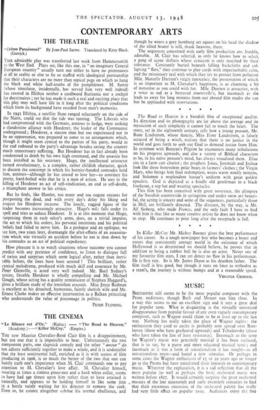THE CINEMA
"Le Silence est d'Or." (Rialto.) — "The Road to Heaven." (Academy.)—" Killer McCoy." (Empire.)
THE new Maurice Chevalier-Rene Clair film is a disappointment, but not one that it is impoisible to bear. Unfortunately the two component parts, one slapstick comedy and the other "amour" do not adhere sufficiently together to make a whole, and it is undeniable that the least sentimental half, enriched as it is with scenes of film producing in 1906, is so much the 'better of the two that one can barely curb one's impatience when M. Clair commands one to pay attention to M. Chevalier's love affair. M. Chevalier himself, wearing at times a rimless pince-nez and a hard white collar, seems to have had age thrust upon him rather than to have attained it naturally, and appears to be holding himself in like some jinn in a bottle vainly waiting for his director to remove the cork. Even so, he cannot altogether subdue his normal ebullience, and
though he wears a grey homburg set square on his head the shadow of the tilted boater is still, thank heavens, there.
The sequences concerned with early film production are, frankly, adorable. M. Clair has selected, as only he knows how to select, a gang of scene shifters whose cynicism is only matched by their tolerance. Constantly buried beneath falling backcloths and col- lapsing "flats," they continue to play cards with imperturbable calm, and the missionary zeal with which they try to protect from pollution Mlle. Marcelle Darrien's virgin innocence, the preservation of which is so important to M. Chevalier's happiness, is as charming a bit of nonsense as you could wish for. Mlle. Darrien is attractive, with a voice as sad as a bereaved tourterelle's, but inasmuch as she leads us away for long minutes from our absurd film studio she can but be applauded with reservations.
The Road to Heaven is a Swedish film of exceptional quality. Its direction and its photography are far above the average and its mysticism of such simplicity it cannot fail to touch the heart. The story, set in the eighteenth century, tells how a young peasant, Mr. Rune Lindstrom, whose fiancee, Miss Eiver Landstrom, is falsely accused of being a witch, realises that there is no justice in the world and goes forth to seek out God to demand justice from Him. In common with Bunyan's Pilgrim he encounters many tribulations on his progress upwards, and also a variety of Biblical characters as he, in his naive peasant's mind, has always visualised them. Elias sits in a farm cart chariot ; the prophets Jonas, Jeremiah and Joshua look like three benevolent polar bears in farmers' clothes ; the Virgin Mary, who brings him final redemption, wears warm woolly mittens, and Solomon a resplendent hussar's uniform with great golden epaulets. God is depicted as a kindly old gentleman in a black frockcoat, a top hat and wearing spectacles.
This film has been conceived with great reverence, the glimpses of the Swedish countryside in springtime and under snow are beauti- ful, the acting is sincere and some of the sequences, particularly those in Hell, are brilliantly directed. The director, by the way, is Mr. Alf Sjoberg, who made Frenzy, and the only fault I have to find with him is that like so many creative artists he does not know when to stop. He continues to pour long after the receptacle is full.
In Killer McCoy Mr. Mickey Rooney gives the best performance of his career. As a tough newspaper boy who becomes a boxer and enters that consistently corrupt world in the existence of which Hollywood is so determined we should believe, he proves that in addition to being a rubber ball he is also an actor. Never one of my favourite film stars, I can yet detect no flaw in his performance. He is first rate. So is Mr. James Dunn as his drunken father. The film itself is less good, but though it runs on lines as orthodox as a tram's, the journey is without bumps and at a reasonable speed.
VIRGINIA GRAHAM.


































 Previous page
Previous page